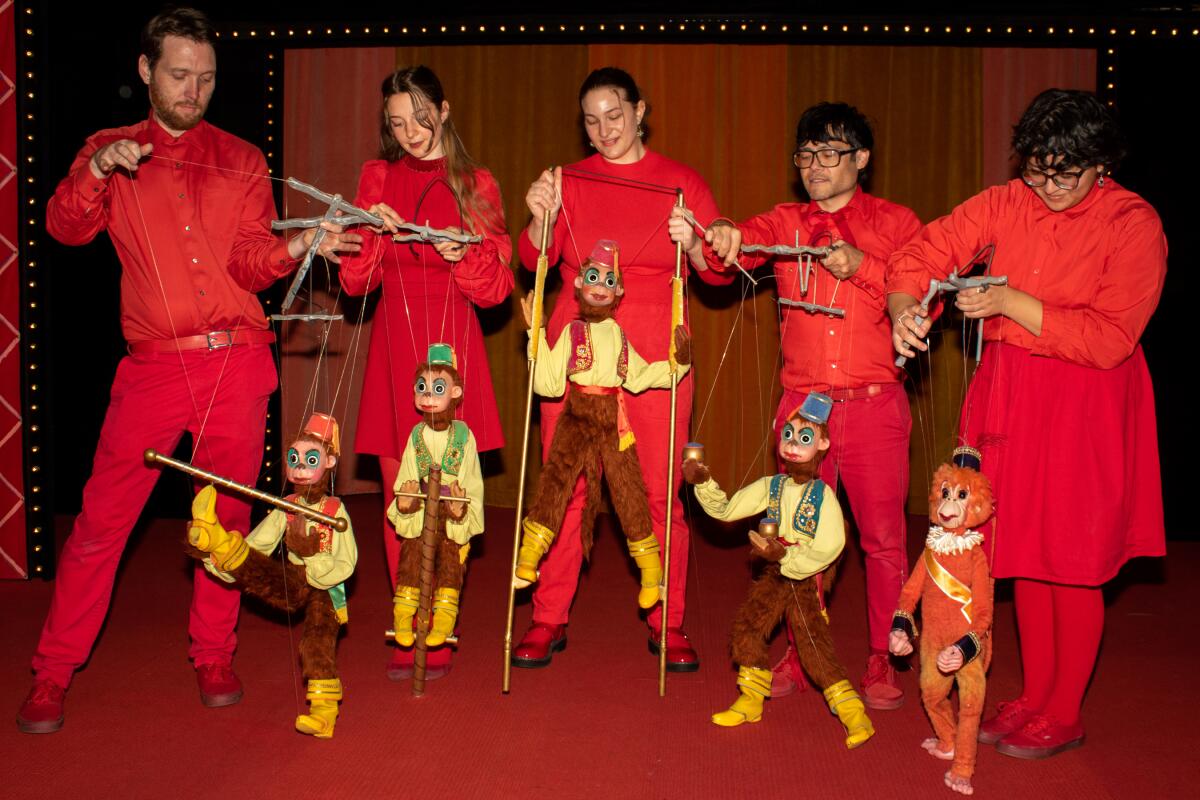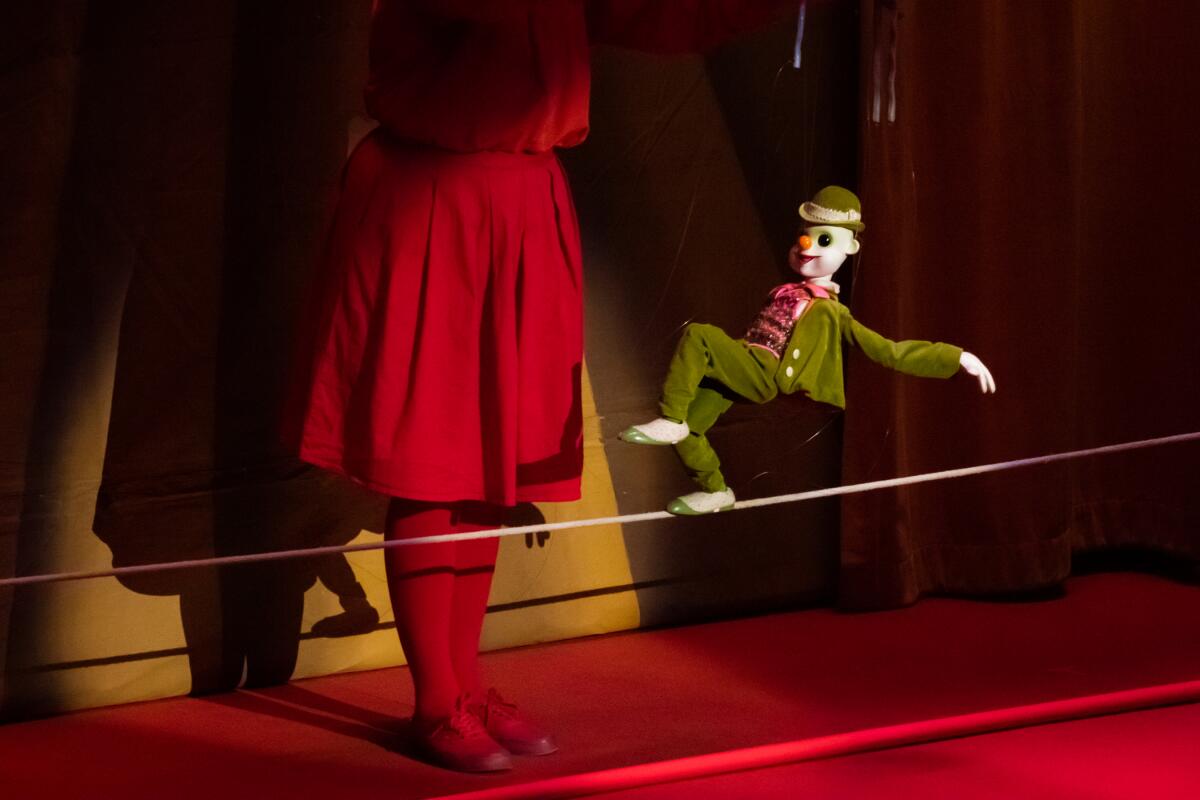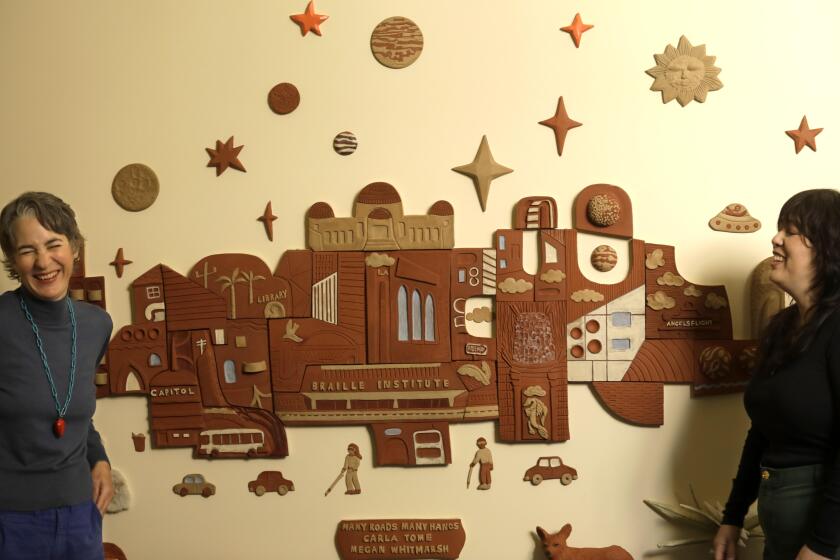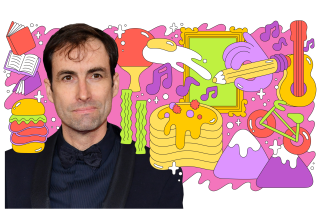A celebration of Bob Baker Day brings L.A.’s puppeteering past to life

Bob Baker Marionette Theater has been an L.A. institution for 60 years. Although it was forced to move in 2019 from its original location in downtown L.A., which had been designated a historic landmark, its new site in Highland Park still draws full houses. Many of the parents who attend with their children are multigenerational Bob Baker fans who recall attending the lively puppet shows and eating the post-show ice cream treats when they were children. And although the theater is a special institution in L.A., it is only the tip of the iceberg of a sizable community of puppet theaters throughout Los Angeles, which in turn is a cross-section of the larger story of puppetry in America.
Given that the upcoming ninth celebration of Bob Baker Day, a free festival taking place at the 32-acre Los Angeles State Historic Park, is coming up on Sunday (rescheduled from February due to rain), prominent members of the local puppet scene spoke to The Times about Bob Baker Marionette Theater and the rich history of puppetry in Los Angeles.
Christine Papalexis, a former president of the L.A. Guild of Puppetry, explained that the group, which currently has around 200 members, started in 1956. “I think there were maybe 30 people [who] got together because they all loved puppetry. A lot of them were doing their own puppet shows, and they just wanted to be together and learn together. It was a club.”
The little club of puppeteers exchanging ideas about their craft grew into the L.A. Guild of Puppetry, which is a charter of the Puppeteers of America, an institution born during the the Great Depression.
“Basically what happened in the ‘30s, as part of the arts program the WPA [Works Progress Administration], was that Roosevelt pumped a lot of money into the [arts]. … There was a lot of money put into puppetry,” Papalexis said. “And, because there was some money there, there was an educational aspect where [puppeteers] could advance the art of marionettes and then take it out to schools and libraries and all kinds of places where they could entertain people.”
From this movement, one of the first puppet theaters to rise to prominence in Los Angeles was a hot spot principally run by three guys known as the Yale Puppeteers.
“The Yale Puppeteers came out and they did shows, first at Olvera Street, which also had a history of doing marionette theater, and then they opened this theater called the Turnabout Theater, on La Cienega [from 1941 through 1956]. … Basically, it really appealed to Hollywood, so a lot of celebrities would go there, and they had celebrity marionettes,” Papalexis continued. “You’ve probably seen that famous photo of Albert Einstein holding a marionette of himself. That was a marionette that those guys made at the Turnabout Theater.”
Additional puppet theaters of note included Fairyland, which Papalexis recalled was in the San Fernando Valley. “I saw pictures of [former guild board member] Beth Fernandez in her 80s and showing pictures of [the theater’s puppeteers] doing puppet shows; she had this big beehive hairdo and glamorous gown and stuff. I mean, it was a very glamorous kind of endeavor. It’s funny; going back to the WPA days, men used to wear tuxedos when they were doing live shows in the ’40s and ’50s. And there were women that also did these marionette shows, and they would wear ball gowns to work marionettes. It was so fancy.”

There was also Jim Gamble in the South Bay. He had a huge batch of people doing marionette shows, mostly for kids’ birthday parties and school assemblies, which he performed until 2007 (he died in 2016 at age 78).
Papalexis also remembers a company called Mitchell Marionettes. “They had a stage coach kind of thing, and they would go around … it was really cool. There’s [Gary Jones], an older, African American puppeteer, who runs Blackstreet USA Puppet Theatre. [And there was] Steve Meltzer, who had this magical little theater [called Santa Monica Puppetry Center]. He was also president of the guild for a while.”
And then, of course, there is Bob Baker Marionette Theater, which opened its doors in 1963 and is one of the longest-running puppet theaters in the U.S.
Papalexis started working at BBMT in the ‘80s, and in the early 2000s she became heavily involved with the guild. “At one point I became vice president; then I became president; and then I started producing puppet slams [one-off puppetry programs] in 2011 [when] we got a grant from Heather Henson’s company, Handmade Puppet Dreams. She’s the youngest of the Henson clan, and she’s a huge supporter of puppetry … she [sponsors] like 90 or 100 puppet slams all over the country.”
Currently, Alex Evans is the executive director and head puppeteer at BBMT. Evans explained how he discovered the theater. “I went to school for film and photography, like many people in Los Angeles. [I was] super interested in stop-motion, and I was doing a semester in L.A. where I was supposed to intern on a film set, but I googled ‘Los Angeles puppets’ and Bob Baker came up.”
Before that, Evans didn’t think much about marionettes. But when he saw a show at Bob Baker’s theater back in 2007 he was floored. I was like, ‘Oh, wow, this is what you can do with puppets?’ And just the whole space of Bob Baker and the history and connection to L.A. captivated me.”
Although eviction from the original location was heart-breaking to everyone who loved the space, BBMT has been thriving in its new location in Highland Park. “There was such history there; like every little fiber of dust on the wall meant so much to everybody,” Evans said. “But in the new space, frankly, it’s shocking how quickly it just felt like Bob Baker, and the theater we’re in now is a hundred-year-old vaudeville theater. So, instead of feeling like we’re losing history, it felt like we gained a hundred years of new history with the new building, and the neighborhood in Highland Park is incredible.”
Currently, BBMT maintains a steady supply of puppeteers and crowds. “Every time we hire a puppeteer, we line the block with people that want to do it and be a part of it. We’re kind of racing to develop better educational programs to help teach people puppetry,” Evans said.
The demand for the art form has grown tenfold. In January, which is [usually] a slow time, the theater added more shows that all sold out. “People love it; people eat it up,” Evans said. “At Bob Baker, we try and find this ground where it’s accessible to all, so both puppet lovers and people who really have a deep respect for the art form can have a lot of takeaway.”
Bob Baker Day started in 2015 as a commemoration of Baker, who passed away the previous year. The all-day event serves as a way to celebrate both Baker’s birthday and his legacy; it features puppetry, art and music. Last year, it attracted over 20,000 guests. This year’s event will feature grand marshal Pinocchio from Guillermo del Toro’s Oscar-winning film, “Pinocchio.”
Additional guests include King Kukulele, Joe Selph & Rene’s Marionettes, Pacific Opera Project, Randal Metz, Hollow Trees, Kate Miccuci, Marawa, Buster Balloon, Very Be Careful and more. Additional features of the day include: all-day puppet shows, a kids’ talent show, a craft market with more than 40 vendors and artisans, a food market with food trucks, activities and art for all ages, a history exhibition with Forest Lawn Museum, and much more. The event is free, but RSVPs at bobbakerday.com are required.
Additional programming at BBMT is ongoing. Evans pointed out, “Every month we do a program called Schoolhouse Rocks, where it’s like a rock ’n’ roll band that plays music and the puppets come out and perform. [During] Halloween season, we do live reads of classic scary things like the Addams Family, Scooby-Doo, and fun things like that.”
Meanwhile, Papalexis keeps her hands busy with guild programming, including an ongoing series of puppet slams, called “Puppetzilla.” And the guild’s current president, Rachel Burson, whom Papalexis said, “has been an amazing, dynamic president,” has been organizing a monthly gathering of puppeteers, over coffee and donuts, for a casual exchange of ideas and puppet-related conversations, in a manner reminiscent of the earliest incarnations of the guild.
For more details about guild events, visit laguildofpuppetry.org, and for more information about BBMT events, visit bobbakermarionettetheater.com.
More to Read
The biggest entertainment stories
Get our big stories about Hollywood, film, television, music, arts, culture and more right in your inbox as soon as they publish.
You may occasionally receive promotional content from the Los Angeles Times.












